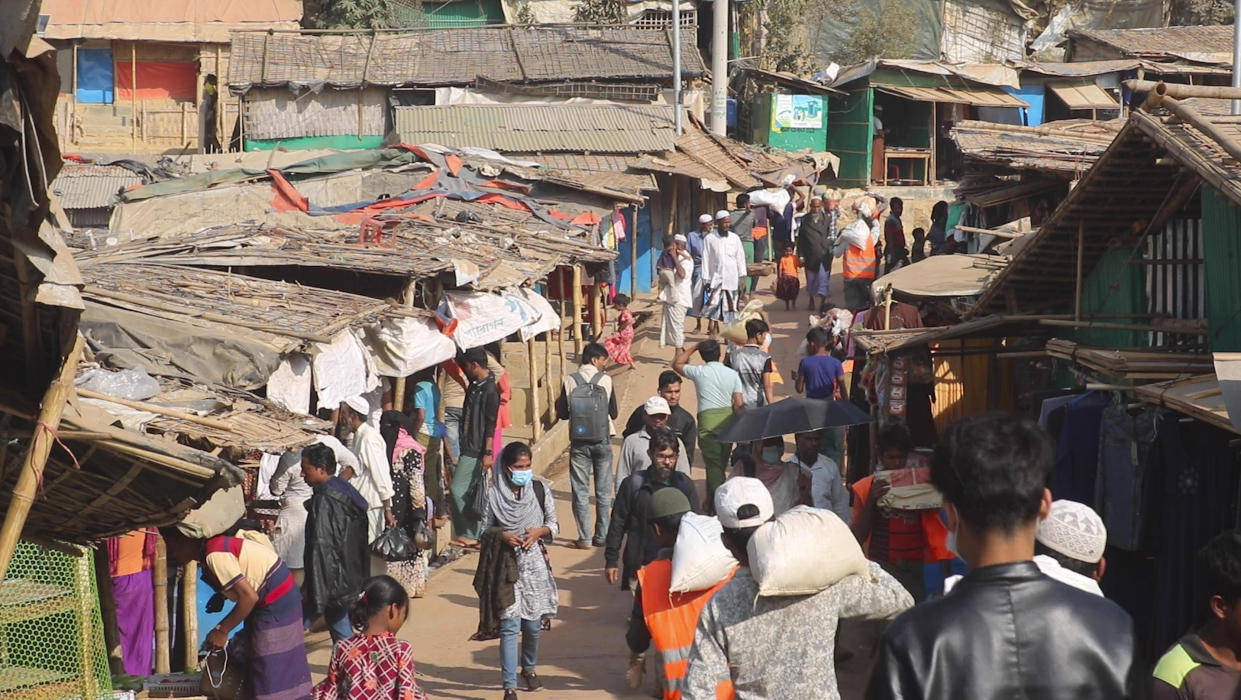As ethnic armed group claims to have captured a town in western Myanmar, Muslim Rohingyas flee again

BANGKOK (AP) — A powerful ethnic armed group fighting Myanmar’s military government in the country’s western state of Rakhine claimed Saturday to have seized a town near the border with Bangladesh, marking the latest in a series of victories for foes of the country’s military government.
Members of the state’s Muslim Rohingya ethnic minority, targets of deadly army-directed violence in 2017, appear to have been the main victims of fighting in the town of Buthidaung, where the Arakan Army claims to have chased out forces of the military government.
There are contradictory accounts of who is to blame for the reported burning of the town, compelling its Rohingya residents to flee.
The competing claims could not be verified independently, with access to the internet and mobile phone services in the area mostly cut off.
Khaing Thukha, a spokesperson for the Arakan Army, told The Associated Press by text message from an undisclosed location that his group had seized Buthidaung after capturing all the military’s outposts there.
The Arakan Army is the well-trained and well-armed military wing of the Rakhine ethnic minority movement, which seeks autonomy from Myanmar’s central government. It is also a member of an armed ethnic group alliance that recently gained strategic territory in the country’s northeast on the border with China.
The group said in a Saturday statement on the Telegram messaging platform that fighting was ongoing on the outskirts of Buthidaung as its troops chased after the retreating army soldiers and local Muslims it said were fighting alongside them.
Khaing Thukha said the Arakan Army’s troops were caring for Muslim villagers fleeing the fighting.
He denied allegations by Rohingya activists on social media that the Arakan Army had set fire to the town, which is mostly populated by Rohingya.
Rohingya have lived in Myanmar for generations, but they are widely regarded by many in the country’s Buddhist majority, including members of the Rakhine minority, as having illegally migrated from Bangladesh. The Rohingya face a great amount of prejudice and are generally denied citizenship and other basic rights.
The Rohingya were the targets of a brutal counterinsurgency campaign incorporating rape and murder that saw an estimated 740,000 flee to neighboring Bangladesh as their villages were burned down by government troops in 2017.
Ethnic Rakhine nationalist supporters of the Arakan Army were also among the persecutors of the Rohingya minority. However, the 2021 military coup that ousted the elected government of Aung San Suu Kyi shifted political alignments, with a resistance movement against military rule -- a position shared by the Arakan Army --counting the Rohingya population among its allies.
Lingering tensions between the ethnic Rakhine Buddhists and the more than 600,000 Rohingya are still living in Rakhine flared when the government in February recruited Rohingya living in displacement camps to do military service. Both coercion and promises of citizenship were reportedly employed to get them to join.
Nay San Lwin, a co-founder of the Free Rohingya Coalition group based outside of Myanmar, said in a Friday email to the AP that the Arakan Army had warned Buthidaung’s Rohingya residents to evacuate the town by 10 a.m. on Saturday, and that more than 200,000 Rohingya seeking refuge there in houses, government buildings, a hospital, and schools, were in an extremely dangerous situation.
He also alleged that the Arakan Army had fired on a school and a hospital where displaced Rohingya are sheltering, resulting in deaths and injuries.
Aung Kyaw Moe, a Rohingya who is deputy minister for human rights in the resistance movement’s shadow National Unity Government, wrote on his Facebook page on Saturday that Buthidaung had been burned to “a pile of ash” and that its residents had fled to rice fields outside of town.
He did not clearly lay blame for the arson, but said the situation was dire for those who fled.
“A comprehensive and impartial investigation needs to be carried out and those responsible must be held accountable," he wrote. "Revolution against the military dictatorship is not a license to do anything you want. ‘War has rules.’”
The Arakan Army’s Khaing Thukha described the allegations his group was responsible were baseless, claiming the houses caught fire due to the airstrikes by the military government. He also said retreating army troops and what he called their allies in “terrorist organizations" — meaning Rohingya guerrilla groups — and local Muslims inducted into the military also set fire to houses as they retreated.
The military government has a well-established record of burning down villages as it battles pro-democracy and ethnic separatist groups opposed to military rule

